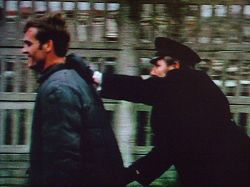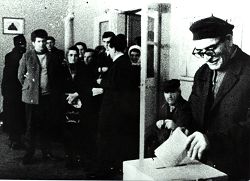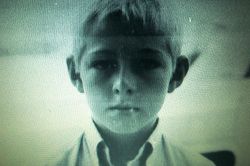5 stars - classics of documentary cinema
Chronicle of a Summer / Chronique d’un été
Jean Rouch & Edgar Morin / France / 1961 / 85 min / French
A simple question - Are you happy? – and a range of complex answers. The first cinéma vérité documentary. A true landmark in film history.
From a simple starting question “Are you happy, sir?” Chronicle of a Summer delves deeper and deeper into the lives of its characters. They include Marceline, a Holocaust survivor; Angelo, who works grueling shifts in a Renault factory; Landry, a student from the Ivory Coast; and Marilou, a young, beautiful and deeply depressed Italian immigrant. As the film progresses, the light opening scenes give way to intimate revelations and hotly contested political arguments (it’s the time of the Algerian War). Rouch and Morin were among the first filmmakers to use hand-held sync sound 16mm equipment. They also coined the term cinéma vérité to describe their approach, although their practice, placing people in situations and provoking responses, differs from what later came to be called vérité films. The film's self-reflexive structure, in which Rouch and Morin show the film for the participants to critique on-screen, as well as their own reactions to the criticism, is still, amazingly contemporary. A true landmark in film history.
producer: Anatole Dauman
editor: Jean Ravel, Nina Baratier, Françoise Colin
camera: Michel Brault, Raoul Coutard, Roger Morillière, Jean-Jacques Tarbès
sound: Michel Fano, Guy Rolfe
production info:
Argos Films
26 rue Montrosier
92200 Neuilly-sur-Seine, France
tel: (33-1) 4722-9126
fax: (33-1) 4640-0205
sales info:
Tamasa Distribution
122 rue La Boétie
75008 Paris
tel. : +33 (0) 1 43 59 01 01
fax : +33 (0) 1 43 59 64 41
c-ducinema@wanadoo.fr
From a Night Porter’s Point of View / Z punktu widzenia nocnego portiera
Krzysztof Kieslowski / Poland / 1977 / 17 min / Polish
The views of a paranoid night porter whose favorite pastime is checking up on others - the Communist system in a nutshell.
With considerable economy and grace, Kieslowski's early short elucidates the workings of the Communist system by airing the views of a misanthrope whose favorite pastime is checking up on other people. This factory porter, a fanatical supporter of strict discipline, tries to oversee everybody and everything in the belief that rules are more important than people. “When a man doesn't obey the rules,” he says, “he's a goner... Children have to conform to the rules too, and adults who live on this earth, for whom this beautiful world has been created. I reckon you've got to have capital punishment ... Just hang him [the culprit]. Publicly. Dozens, hundreds of people would see it.” From a Night Porter’s Point of View is a deep and fascinating portrait of a blind supporter of state power, who does as much as he can with the little authority he has.
producer: Wojciech Kapcynski
editor: Lidia Zonn
camera: Witold Stok
sound: Wieslawa Dembinska, Michal Zamecki
music: Wojciech Kilar
sales info:
Maciej Prawdzic-Kornacki
Filmoteka Narodowa
mkornacki@fn.org.pl
Primary
Robert Drew / USA / 1960 / 60 min / English
John F. Kennedy versus Hubert Humphrey during the 1960 Wisconsin presidential primary. The beginning of direct cinema in America.
"A new kind of reporting, a new form of history," Robert Drew promised John F. Kennedy. He was proposing that a revolutionary, small camera operated by cameraman Rickard Leacock and sync-sound recorder operated by himself, live with Kennedy day and night for nearly a week during the climax of his 1960 Wisconsin presidential primary run against Hubert Humphrey. Unlike the directed, narrated documentaries of the day, Drew's freewheeling photography moved with its subjects and brought audiences straight into the action. It captured Kennedy's rock-star-like presence and Jackie's quiet radiance. It granted audiences unprecedented access into the world of a young politician and his glamorous wife as they campaigned across the Wisconsin landscape and navigated their way through throngs of ardent supporters. The resulting film, Primary, turned out to be a cinematic experience unique in the history of film, the first in the development of American cinéma vérité.
producer: Robert Drew
editor: Robert Drew, Richard Leacock
camera: Richard Leacock
production info:
Drew Associates
56 Gay St.
P.O. Box 1702
Sharon, CT. 06069
tel: +1 (860) 364-5349
fax: + 1(860)364-5192
www.drewassociates.net
The Resolution / A határozat
Gazdag Gyula & Ember Judit / Hungary / 1972 / 105 min/ Hungarian
Why would a Communist Party committee want to ruin a successful cooperative? An insight into the workings of Kadar’s Hungary. One of the “Best 100 Documentaries of all time” by the International Documentary Association.
1971: a PC District Secretary decides to remove the chair of an agricultural cooperative. After a county-level deliberation the Party bureaucrats confront the co-op leadership. At the coop’s general meeting, despite a peculiar balloting procedure, the farmers vote against removal. Stung, the Party tries to enforce a second ballot – to no avail. In the postscript the honchos offer their postmortem. The coda is cut short by the Party Secretary: “that’s it”. The following year the chair was recalled by assembly of the co-op. One of the “Best 100 Documentaries of all time” by the International Documentary Association.
editor: Gyula Gazdag
camera: Péter Jankura
sound: István Sípos
sales info:
Béla Balázs Studio Archive
1146 Budapest, Dózsa György út 37.
tel: +36 1 460 7000 / ext. 118
bbs@mucsarnok.hu
The Thin Blue Line
Errol Morris / USA / 1988 / 103 min / English
Billed as "the first movie mystery to actually solve a murder," the film examines the 1976 murder of a Dallas policeman, and the wrongful conviction of a man implicated in the killing.
The Thin Blue Line is the fascinating, controversial true story of the arrest and conviction of Randall Adams for the murder of a Dallas policeman in 1976. Billed as the first movie mystery to actually solve a murder, the film is credited with overturning the conviction of Randall Dale Adams, who was sentenced to death. With its use of expressionistic reenactments, interview material and music by Philip Glass, it pioneered a new kind of non-fiction filmmaking. The film was the result of a 30-month investigation by Errol Morris, one of America's strangest and most brilliant documentary filmmakers, who sometimes jokes that he is not a "producer-director" but a "detective-director."
producer: Mark Lipson
editor: Paul Barnes
camera: Robert Chappell, Stefan Czapsky
music: Philip Glass
saels info:
Kim Kalyka
IFC FILMS
Eleven Penn Plaza, 18th floor
New York, NY 10001
tel: + 1 646-273-7209
fax: +1 646-273-7250
kakalyka@ifcfilms.com






![]()